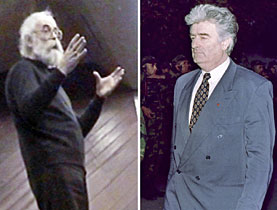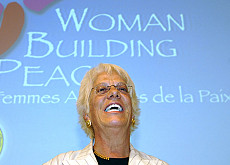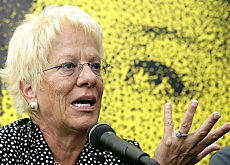Radovan Karadzic arrested in Serbia

Former Bosnian Serb leader Radovan Karadzic, accused architect of war crimes including Europe's worst massacre since the Second World War, has been arrested.
Karadzic had been on the run for more than a decade. The failure to catch him had been a source of regret for the former chief prosecutor at the United Nations tribunal for the former Yugoslavia, Swiss lawyer Carla Del Ponte.
Karadzic was charged with organising the deadly siege of Sarajevo and the 1995 massacre of up to 8,000 Muslims in Srebrenica.
Prosecutors, including Del Ponte, suspected he eluded the manhunt with the help of Bosnian Serb nationalists and a string of elaborate disguises.
“This is a very important day for the victims who have waited for this arrest for over a decade,” said the tribunal’s head prosecutor, Serge Brammertz. “It clearly demonstrates that nobody is beyond the reach of the law and that sooner or later all fugitives will be brought to justice.”
In January Brammertz succeeded Del Ponte, who had repeatedly criticised the Serbian government’s efforts to hand over suspected war criminals. Del Ponte failed to bring in Karadzic and army chief Ratko Mladic, and former Yugoslav President Slobodan Milosevic died in his cell in March 2006 during his trial.
Serbian President Boris Tadic’s office said Karadzic, 63, was arrested on Monday evening “in an action by the Serbian security services” and taken before the investigative judge of Serbia’s war crimes court, indicating imminent extradition to the UN war crimes court in The Hague, Netherlands.
Heavily armed special forces of the Serbian police were deployed around the war-crimes court in Belgrade, apparently fearing a backlash from nationalists who consider Karadzic their war hero.
“He did not surrender, that is not his style,” his brother Luka Karadzic said outside the court.
A picture shown to reporters on Tuesday showed an unrecognisable Karadzic, markedly thin, with a long white beard and flowing hair. Serbian officials said he was walking freely around town and earned money from practising alternative medicine.
Swiss reaction
The Swiss foreign ministry welcomed the news, describing Karadzic’s arrest as an “important stage” in dealing with the “painful conflict that tore apart the former Yugoslavia”.
“This is a victory for justice and for the principle that war crimes must never be allowed to go unpunished,” said Foreign Minister Micheline Calmy-Rey’s office in a statement.
The ministry underlined Switzerland’s involvement in international criminal justice, having supported the UN tribunal for the former Yugoslavia since its creation in 1993.
The international tribunal indicted Karadzic on genocide charges in 1995. The psychiatrist and self-styled poet turned hardline Serbian nationalist still wielded power among Bosnian Serbs from the shadows and occasionally appeared in public before he went on the run in 1998.
Federico Andreu Guzman, general counsel at the International Commission of Jurists in Geneva, told swissinfo he also welcomed the arrest.
“This is very good news – it’s a very clear signal from the Belgrade authorities. No one had found [Karadzic] for more than a decade and suddenly [the Serbian government] arrests him. This shows new political will from Belgrade,” he said.
Andreu Guzman said the timing of the arrest was because of several factors coming together.
“One is the new pro-European government. There has also been pressure from the European Union – the arrest of Karadzic [and other wanted war suspects] is a precondition for [Serbian] EU membership. There was also pressure from the United States.”
“Historic day”
Karadzic’s whereabouts had been a mystery to UN prosecutors, unlike those of his wartime military commander Ratko Mladic, who had last been spotted living in Belgrade in 2005 and remains at large.
However, nationalists lost power in Serbia when a new pro-Western government took over in June and removed the nationalist official who held the office of secret police chief, the official formally in charge of arresting war crimes suspects.
Richard Holbrooke, the US diplomat who brokered the Dayton deal ending the war, said Karadzic was responsible for the deaths of 300,000 people and his arrest marked “a historic day”.
Under the UN indictment, last amended in May 2000, the UN war crimes tribunal charged Karadzic with 15 counts of genocide, war crimes, crimes against humanity and other atrocities committed between 1992 and 1996.
It would almost certainly take many months for Karadzic to stand trial due to the complexity of his case, expected legal wrangling and a packed docket.
In the past, the court has sometimes released suspects under strict conditions to await trial in their home country. However there is virtually no chance that will happen in Karadzic’s case.
swissinfo with agencies
The ICTY was established by Resolution 827 of the UN Security Council in May 1993.
Based in The Hague, it is the first international body for the prosecution of war crimes since the Nuremberg and Tokyo trials held after the Second World War.
The tribunal has jurisdiction over individuals responsible for genocide, war crimes and crimes against humanity in the territory of former Yugoslavia after January 1, 1991.
Born in Savnik, Yugoslavia, in what is now the Republic of Montenegro, Karadzic became a founding member of the Serbian Democratic Party in Bosnia-Herzegovina in 1990.
Two years later, he was elected president of the three-person presidency of the Serbian republic in Bosnia, which had just been freshly recognised as an independent state by the United Nations.
He became sole president of the Serb Republic in Bosnia that year, remaining in that position until 1996 and also serving as supreme commander of the armed forces.
His life changed by the time the war ended in late 1995 with an estimated 250,000 people dead and another 1.8 million driven from their homes. He was indicted twice by the UN tribunal on genocide charges stemming from his alleged crimes against Bosnia’s Muslims and Croats.
Karadzic’s reported hide-outs included Serbian Orthodox monasteries and refurbished mountain caves in remote eastern Bosnia. Some newspaper reports said he had at times disguised himself as a priest by shaving off his trademark silver mane and donning a brown cassock. Others said he wore women’s wigs.

In compliance with the JTI standards
More: SWI swissinfo.ch certified by the Journalism Trust Initiative


You can find an overview of ongoing debates with our journalists here. Please join us!
If you want to start a conversation about a topic raised in this article or want to report factual errors, email us at english@swissinfo.ch.